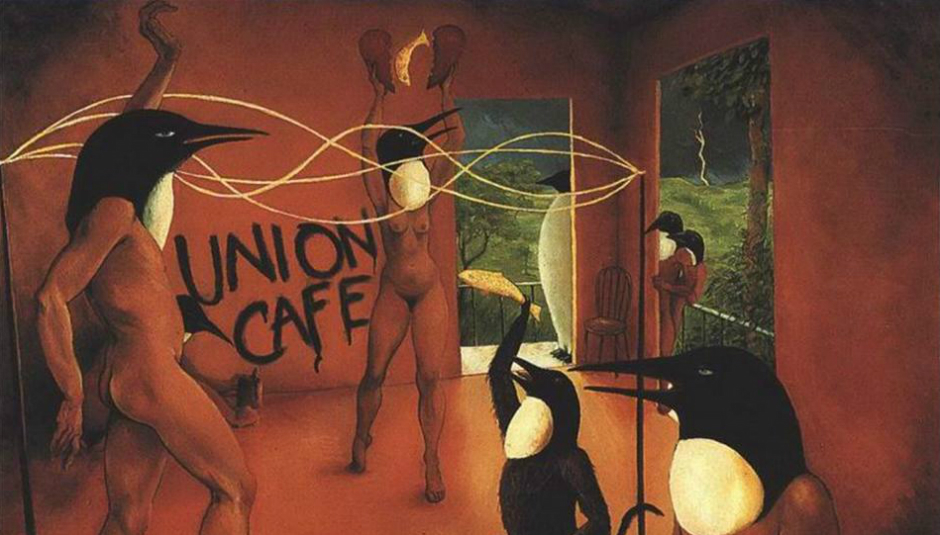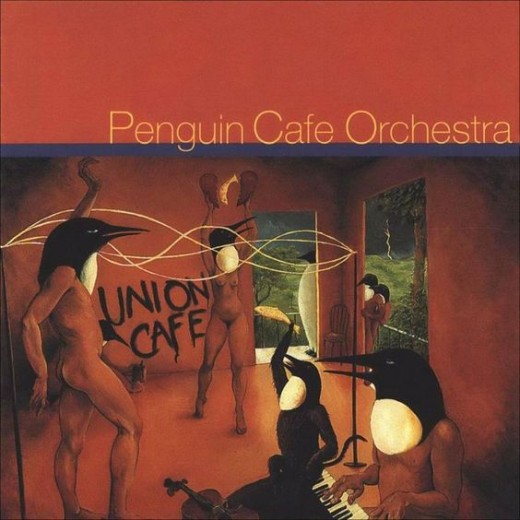Fact: penguins are not festive. Don’t be fooled every time you see one stuffed into a garish Christmas jumper on the front of your greeting cards, and join me and my national campaign in returning them to the sender with a ‘must do better’ message attached. Some species live in areas as tropical as the Galapagos Islands, whilst none, whatsoever, live in the northern hemisphere, supposedly the headquarters of Father Christmas’ operations. Every time we see the ludicrous line up of one fuzzy friend between the big man himself and a polar bear part of my zoological soul dies, and it’s something I’ll stand for no longer.
However, one exception I’ll gladly take this year is the return of Penguin Cafe Orchestra in the form of a reissue of their final studio album, Union Cafe. The warmth PCO exude through their avant-garde folk-jazz crossovers and bright, expansive arrangements is certainly welcome at such a cold time of year. Whilst their uplifting melodies have helped advertisers flog train journeys, cars and energy amongst other things, isn’t advertising what this time of year is all about *shudder*?
Overshadowing both of these points, however, is the 20th anniversary of the passing of founding member Simon Jeffes. “Union Cafe marked a move towards a definitive English pastoral sound combined with larger string arrangements set against longer solo piano pieces” said Simon’s son, Arthur Jeffes. “With this last album they got even closer to the PCO idea of squaring the circle of intellectually challenging modern music that is still actually beautiful.”
It’d be fruitless to tell you just what a great album Union Cafe is. As with any critically-acclaimed reissue, the questions one has to ask themselves is what influence the album holds over more contemporary music, how the album has matured and developed over the years and why its timely to rerelease today. Union Cafe, and PCO more broadly, have commendably spread their influence amongst many artists today. Mammal Hands and GoGo Penguin both echo tracks such as ‘Silver Star of Bologna’ in their dynamism and powerful melodies, whilst ‘Vega’ conveys an endearing similarity to Masabumi Kikuchi’s ‘Little Aby’, in which Simon Jeffes almost endearingly rediscovers the joys of the piano through the most elemental two-note motif and spaced improvisations. ‘Lie Back and Think of England’ features rich string arrangements that A Winged Victory For The Sullen would be proud to call theirs, whilst ‘Thorn Tree Wind’ features Eno-esque minimalist productions. But you don’t need to look any further than Arthur Jeffes, who has lovingly continued his father’s legacy as Penguin Cafe, and testaments don’t come much stronger than that.
Jeffes’ dystopian vision which formed the backbone of PCO remains as relevant as ever. In 1972 he suffered an unfortunate (for him, fortunate for fans) experience with food poisoning, which led to a vivid dream regarding a charming place of solace, harmony and the orchestra’s unique music came to life amidst brutal concrete structures and darkness. Jeffes bought this vision to life for the next 25 years, with the final offering comprising Union Cafe. Without becoming a typical negative nelly, doesn’t darkness and brutal concrete sound familiar at the end of 2017? PCO have once again offered their hand in escapism, and instantly transported us to gleeful, happier pastures in opener ‘Scherzo & Trio’. You can’t possibly stay unhappy amidst such twee and tinkering harmonies. Combine this with the growing trend of neoclassical orchestrations moving into both the mainstream and club culture (Kiasmos, Christian Löffler), Union Cafe is a reminder that they were extremely early pioneers, and kudos to that.
As ‘Passing Through’ pulls the albums curtains down with a zany, progressive piece centered around water dripping from a sink, you’re left with a wry smile spreading across your face. Even if you reject all of the above, which, of course, one thing you cannot argue with is Union Cafe’s value for money. 75 minutes is a remarkably long running time when you consider that each and every song is unique in its composition, instrumentation and style. It’s an expansive, multidimensional feat that the modern day sadly rarely emulates, but when one group can claim so many more, it’s hard to think of many more triumphant legacies than the one Penguin Cafe Orchestra has left. Dominic Edge







